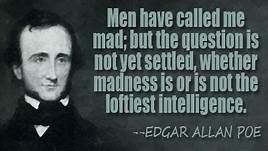~Edgar Allan Poe was a diabolical super genius and one of the greatest writers of all time~
· In Book Club Juxtapositions Episode 1: The Tell-Tale Heart and Episode 2: The Cask of Amontillado, we discussed Edgar Allan Poe (1809-1849). Many have conjectured whether Poe was crazy or drunk and whether those character traits may have influenced his writings- for example, how he was known for writing about obsession, madness, revenge, etc. In his short story, The Tell-Tale Heart, the narrator recounts the story, in the past tense, of an incident between himself and the older man that he was the caretaker for and the obsession he had with his cataract eye. We discussed in this episode that the narrator spent the bulk of the story trying to convince the reader that he was not mad- justifying his sanity and deflecting from his insecurities. He ultimately defers to his character flaw of self-sabotage. We discussed the personal struggles that Edgar Allan Poe had in his personal life- for example, the prominent females in his life who died very young of tuberculosis. So they may have impacted his work.
After reading Edgar Allan Poe’s The Philosophy of Composition, I would argue that he was a very skilled and intentional writer that didn’t write aimlessly to air his grievances based on internal wounds. Poe wrote The Philosophy of Composition in response to a note from Charles Dickens (1812-1870). Dickens, referring to Godwin, says, “By the way, are you aware that Godwin wrote his ‘Caleb Williams’ backwards?” Poe responds in great detail, shamelessly recalling and revealing his method of writing. He says that Godwin must have used a similar process; however, instead of writing backward, he wrote with the end clearly in mind.“Nothing is more clear than that every plot worth the name, must be elaborated to its denouement before anything be attempted with the pen.” Edgar Allan Poe
He emphasizes that it is only with the resolution of the plot clearly in view that a story should unfold and that all parts of the story must be directly connected to the end or should not be written. Poe stated that when considering writing, he must decide how the story should unfold, either by “ordinary incidents and peculiar tone, or the converse, or by peculiarity both of incident and tone…”.After examining his Philosophy, I gave The Tell-Tale Heart and The Cask of Amontillado a second look. In The Tell-Tale Heart, we have a Narrator that is telling about very peculiar incidents. He describes the old man he says, “When the old man looked at me with his vulture eye a cold feeling went up and down my back; even my blood became cold. And so, I finally decided I had to kill the old man and close that eye forever!”. At the same time, he balances the story with an ordinary tone, as seen in how he so calmly tells the police officers that the crying sounds that the neighbors reported were actually his own and that the older man was away visiting a friend. He is so ordinary and calm that the police officers buy his story and are about to leave before he reverts to peculiar incidents and confesses the entire crime. The story is beautifully wrapped up in a Poe bow!
Conversely, in The Cask of Amontillado, Poe uses the opposite approach and starts with ordinary incidents such as a festival during Mardi Gras. He then casually asks a friend to help him identify a rare amontillado. Everything seems very typical; however, we as the reader pick up on clues to the victim’s pending demise through the peculiar tone interlaced through the entire composition. All the while, the denouement is clearly insight in both stories.




No responses yet